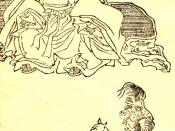Daoism
The first question at hand is to understand what Daoism "is". We can first approach this by looking at the meaning of the word "Dao". "Dao" is an easy word to translate from Chinese, but very complex to define. The English word most closely translated from the Chinese word "Dao" is "The Way". When we use the term "The Way" it means a path from one point to another, a road or pathway to an outcome. This gives us a practical definition and provides us with a means to understand the bases for Daoism. So if we think of Daoism as the "Way", it leads me to ask, "The Way of What?". Fortunately the traditional Chinese teaching of Daoism focuses on the wonder, balance and flow of nature.
The supreme idea of Daoism is that nature has an awesome richness and complexity of processes that seem to guide everything to a wonderful balance.
Daoism is not really a religion, but more of a philosophy in religion. God would not be referred to a creator, but more as the meaning or purpose in nature. Human beings, a Daoist would hold, are an integral part of nature. Daoism does not believe humans had domain over nature; rather it is human's responsibility to live in harmonious balance with nature.
Daoist believed that nature should be the guiding model for human behavior. From nature we should find way to interact with each other.
"Be still like a mountain and flow like a great river." Laozi (Toropov 31)
If one is connected to nature it would provide a kind of spontaneous and intuitive standard to interact with events and situations. Daoism provide humans with a foundation to effectively interact in society. This would require man not to go against nature. Daoism teaches that...


